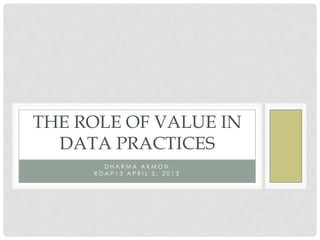
The Role of Value in Data Practices
- 1. THE ROLE OF VALUE IN DATA PRACTICES DHARMA AKMON RDAP13 APRIL 5, 2013
- 2. MOTIVATION • Increasing attention to data as a valuable product of science • Scientists’ actions throughout data life cycle impacts significantly on what is available for preservation and reuse
- 3. PREVIOUS WORK • Scientists withhold or inadequately manage data because: • Documentation is labor intensive and unrewarded (Birnholtz & Bietz, 2003; Campbell et al., 2002; Louis, Jones, & Campbell, 2002) • They are more concerned with publications (Borgman, Wallis, Mayernik, & Pepe, 2007) • They fear data contributions will not be recognized (Louis et al., 2002)
- 4. PREVIOUS WORK CONT. • Social scientists reported they’d be more likely to document and deposit data if they thought data "would be used and have a broader public benefit" (Hedstrom & Niu, 2008) • “Shareable” data are those that are expected to have the greatest potential for generating new results (Cragin, Palmer, Carlson, & Witt, 2010) • Less likely to share high value or hard-won data (Tucker, 2009; Borgman, Wallis, & Enyedy, 2007)
- 5. RESEARCH QUESTION How do scientists conceive of the value of their data, and how is this reflected in their data practices? • What uses for data are salient to scientists? • What time spans do scientists use to think about data's value? • How do scientists create data that are valuable and what do they do to make data accessible over time?
- 6. SITE & METHODS • 3 small teams of scientists at an ecological field station • Teams differed across: • PI career stage • Methodological approach to research • Length of study • Funding source
- 8. NUTRIENT UPTAKE IN STREAMS (NUS) TEAM Name* Career Stage Discipline Project Role Elizabeth Assistant prof. Biogeochemistry PI Jessica Assistant prof. Stream ecology PI Tina Graduate student Hydrogeology Graduate researcher Carolyn Undergraduate student Environmental studies Undergraduate researcher Janet Undergraduate student Chemistry Undergraduate researcher *pseudonyms are used to protect identities
- 9. AN EXPERIMENTAL STREAM CHANNEL
- 11. CONCEPTIONS OF DATA’S VALUE • Data exhibited primarily an instrumental value • Value conceptions made up of: • Assumptions about purposes for specific data at hand • Characteristics data needed to exhibit to meet those ends • Beneficiaries of data’s value • Timespan over which data would be valuable
- 12. [. . .] if you think about it short-term it almost kind of seems meaningless. Like sometimes I actually find myself getting caught up in that. I‟m like, „Does it really matter what this exact sedge is?‟ Like if it‟s Juncus balticus or Juncus nodosus, does it matter? But if you think about it in long-term, it’s not just about that. [. . .] It’s not about the little identifying plants [. . .] (Brooke, IM-UR).
- 13. PURPOSE OF NUS STUDY • Addressing a gap in knowledge • How leaf litter affects nutrient uptake in streams • Supporting Hypotheses • Nutrient uptake depends on N:P on the leaves • As the leaves decompose, C:N and C:P increase and nutrient uptake in the different leaf treatments becomes more similar
- 14. “We're doing it in this situation because we want to test the mechanism. […] If it wasn‟t a mechanism-driven question then it wouldn‟t be appropriate to ask it in this setting.” (Jessica-PI)
- 15. The problem […] is that that wasn't the microbes on the leaves that was [taking up the nutrients]. It was algae and microbes and all that fine particulate organic matter. That's why we had to switch to ground water last Wednesday. Because that's […] not what we're interested in. That wasn’t the whole point of why we built all these experimental channels: to grow algae and fine particulate organic matter of unknown C to P to N ratios. (Jessica-PI)
- 16. TYPE DESIGNATIONS & DATA VALUATION • Raw vs. Derived Data • Baseline Data • Ancillary Data • Field vs. Controlled Experiment Data
- 17. “[. . .] the whole experiment was designed around two questions, and you don't have other sorts of variabilities. You don't have differences in ambient concentrations, or differences in site, or differences in channel dynamics that . . . You know, they're all . . . It’s all for the exact same thing . . . all designed just to answer two questions” (Jessica, PI).
- 18. “[…] this is an isolated experiment designed to answer a simple question. […] it's done in these artificial stream channels. I think, to a large extent, the useful life of our actual numbers will probably end when the paper comes out. If we were doing something like this in a stream, or like what we did last year, I think the useful life of that data is a lot longer […]” (Elizabeth-PI)
- 19. “[…] they're not comparable, really, to anything else outside the system that we're working in.”
- 20. “I probably would not reach out to them about this kind of data, because it's an experiment in these channels as opposed to observations of the natural system, which I might be more inclined then to say, „Would you like some component of this data?‟ because it would contribute to baseline information or something. (Elizabeth-PI)
- 21. FIELD VS. CONTROLLED EXPERIMENT • Data gathered through the study of a “natural” system seen as having more broad value • Could go back to the system • Could combine with other data gathered from same place • Controlled experiment data • Only valuable within the context studied, which is transient and deliberately unnatural
- 22. NEXT STEPS • Cross-case comparison • Further exploration of categories of data meaning and those meanings implications in data practices